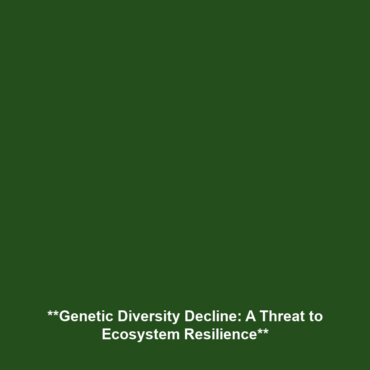Decline in Genetic Diversity: Weakening Ecosystems’ Resilience
The decline in genetic diversity plays a crucial role in understanding the resilience of ecosystems, particularly in the face of deforestation and biodiversity loss. As ecosystems become less diverse genetically, their ability to adapt to environmental changes and challenges diminishes significantly. This decreasing resilience can lead to widespread ecological disruption, threatening species survival and ecosystem services vital to human life.
Key Concepts
Understanding the decline in genetic diversity involves several key concepts:
Genetic Diversity and Ecosystem Resilience
Genetic diversity refers to the variety of genes within a species. High genetic diversity enhances a population’s adaptability to changing environments, making ecosystems more resilient against threats such as climate change and habitat loss.
Impact of Deforestation
Deforestation directly contributes to habitat fragmentation, leading to isolated populations with reduced gene flow. This isolation can instigate inbreeding, which further reduces genetic diversity and weakens ecosystem resilience.
Applications and Real-World Uses
The study of decline in genetic diversity has significant applications in various wildlife conservation and management strategies:
- Conservation Genetics: Techniques such as genetic monitoring and seed banking help maintain genetic diversity in endangered species.
- Restoration Ecology: Understanding genetic variability informs the reintroduction of species and restoration of habitats degraded by deforestation.
These applications of declining genetic diversity are essential in combating the challenges posed by deforestation and biodiversity loss.
Current Challenges
Despite the significance of studying genetic diversity, several challenges persist in this field:
- Data Availability: Limited genetic data from certain species hampers comprehensive studies.
- Policy Barriers: Regulatory frameworks often lack the flexibility needed for effective conservation strategies.
- Public Awareness: Low awareness about genetic diversity’s importance undermines conservation efforts.
Future Research and Innovations
Future research in genetic diversity focuses on innovative approaches that may enhance ecosystem resilience:
- Genomic Technologies: Next-generation sequencing can provide deeper insights into genetic variation within populations.
- Artificial Intelligence: AI models are being developed to predict the impacts of biodiversity loss and identify key areas for conservation.
These innovations aim to bolster ecosystem resilience amidst the ongoing crisis of deforestation and biodiversity loss.
Conclusion
The decline in genetic diversity significantly impacts ecosystems’ resilience, particularly in the context of deforestation and biodiversity loss. Addressing this issue is imperative for the sustainability of natural ecosystems and the services they provide to humanity. As we move forward, increasing public awareness and integrating genetic diversity into conservation strategies will be crucial. For more information on biodiversity and its protection, consider visiting our related articles on conservation strategies and the importance of biodiversity.
